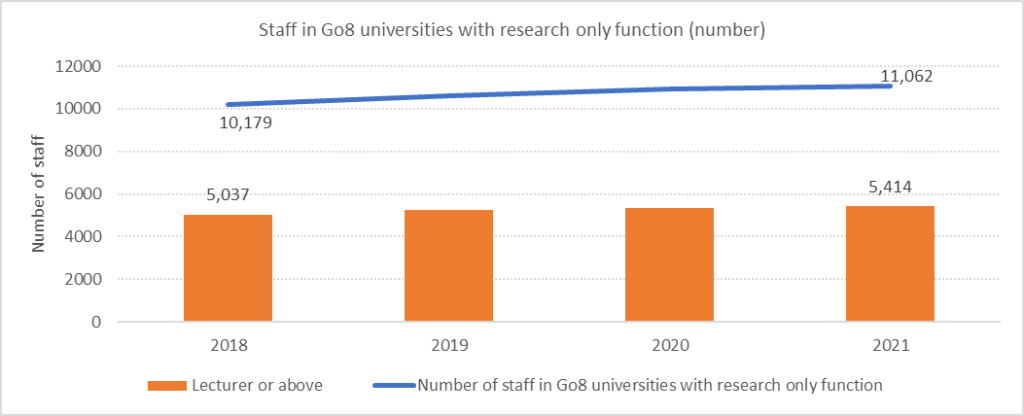April 24, 2023
Australian Bureau of Statistics
ANZSCO Review Team
The Group of Eight (Go8) welcomes the opportunity to provide a submission to the Australian Bureau of Statistics (ABS) for the first round of the comprehensive review of ANZSCO.
Please note that this submission represents the views of the Go8 network and member universities may wish to make their own individual submissions. The Go8 also consents for this submission to be published in full.
The ANZSCO provides an important framework and source of information for governments and other stakeholders, including universities, to identify and assess changes to the Australian workforce.
Regular review and updating of ANZSCO to ensure it accurately reflects real-world practice is increasingly important in the current Australian labour market environment which is characterised by skills shortages across a range of sectors.
An updated ANZSCO will be a valuable tool for the Australian Universities Accord and help inform the work of Jobs and Skills Australia in the context of the forthcoming Employment White Paper.
The Go8 represents Australia’s eight leading research-intensive universities who spend $7.7 billion on research each year, that is around 61 per cent of all expenditure by higher education institutions. This expenditure includes $3.1 billion in all important basic research (including the “pure” pursuit of knowledge), making the Go8 universities a key contributor to total basic research activity in Australia. The importance of recognising basic research concentrated on the pure pursuit of knowledge will be addressed in the body of this submission.
The ANZSCO is intended to describe all occupations for Australia and New Zealand in a mutually exclusive way defined by their primary tasks. The Go8 recognise that both “Researcher” and “Research Assistant” were part of the proposed “emerging occupations” that were under consideration for the previous review of ANZSCO in 2021.
We understand that the occupation “Researcher” was deemed by that review to not be a mutually exclusive occupation, while “Research Assistant” was considered to already be represented in a wide variety of occupations (without adoption of this specific occupation title).
Given the growth and primacy of research-oriented occupations, the Go8 believes it is timely for the ABS to reconsider its 2021 position regarding the occupations “Researcher” and “Research Assistant”, so they can be explicitly included as part of the current ANZSCO review. Further, we propose that both occupations should carry an ANZSCO Skill Level 1 (bachelor degree or higher) classification.
Across the university and other sectors of the economy, the number of people in occupations whose primary task is research continues to grow. The chart below shows both the overall number of staff within Go8 universities, and the number of Go8 staff classified as “Lecturer” or above, that have a “research only function” The total number of research only staff increased to just over 11,000 staff in 2021, as did the number of Go8 research only staff who have a classification of Lecturer or above.

The Go8 believes the value and growth of people in occupations with a primary task of research is downplayed in the existing ANZSCO model. For example, under the current ANZSCO, people undertaking research in the discipline of engineering are coded to the relevant occupation under minor group 233, Engineering professionals.
Yet the existing ANZSCO description of the tasks for the engineering professionals minor group does not explicitly mention research and to the degree that the tasks already described do constitute research, they refer to applied research or experimental development. This is but one example where the existing ANZSCO classification overlooks occupations primarily focused on pure basic research.
In addition, ANZSCO underplays research-based occupations more generally. For example, the sub-major group “24 Education Professionals” has three existing minor groups, the first two of which explicitly mention teaching in their titles, along with a third miscellaneous minor group. Research does not explicitly form part of the occupational titles for this sub-major group. Further, the existing ANZSCO 4-digit unit occupational group “2421 University Lecturers and Tutors” only refers to the task “conducting research and undertaking consultancies in a particular field of knowledge” as the eighth item in a list of 10 tasks. However, the chart above shows people with “Lecturer” titles who are focused only on research.
The Go8 therefore recommends the following revisions to ANZSCO which would enable all research occupations to be better recognised, while preserving mutually exclusivity:
- Rename sub-major Group: 24 – Education Professionals to “Education and Research Professionals”;
- Create a Minor Group 243 entitled “Researchers”;
- Create two Unit Groups – 2431 and 2432 – entitled “University Researchers” and “Non-university researchers”; and
- Create Occupations under these two Unit Groups aligned with the 23 Division codes within the Fields of Research in the Australian and New Zealand Standard Research Classification (ANZSRC). For example:
- “University Agricultural, Veterinary and Food Sciences Researcher”;
- “University Biological Sciences Researchers”; and
- “Non-university Agricultural, Veterinary and Food Sciences Researcher”; “Non-university Biological Sciences Researcher”.
The rationale for this approach is that all major research disciplines can be accommodated explicitly in the ANZSCO list both inside and outside of the higher education sector, to improve and encourage mobility between sectors. This approach also allows for non-university researchers, such as researchers engaged by government, industry, or NGOs, to be explicitly represented in the ANZSCO list.



